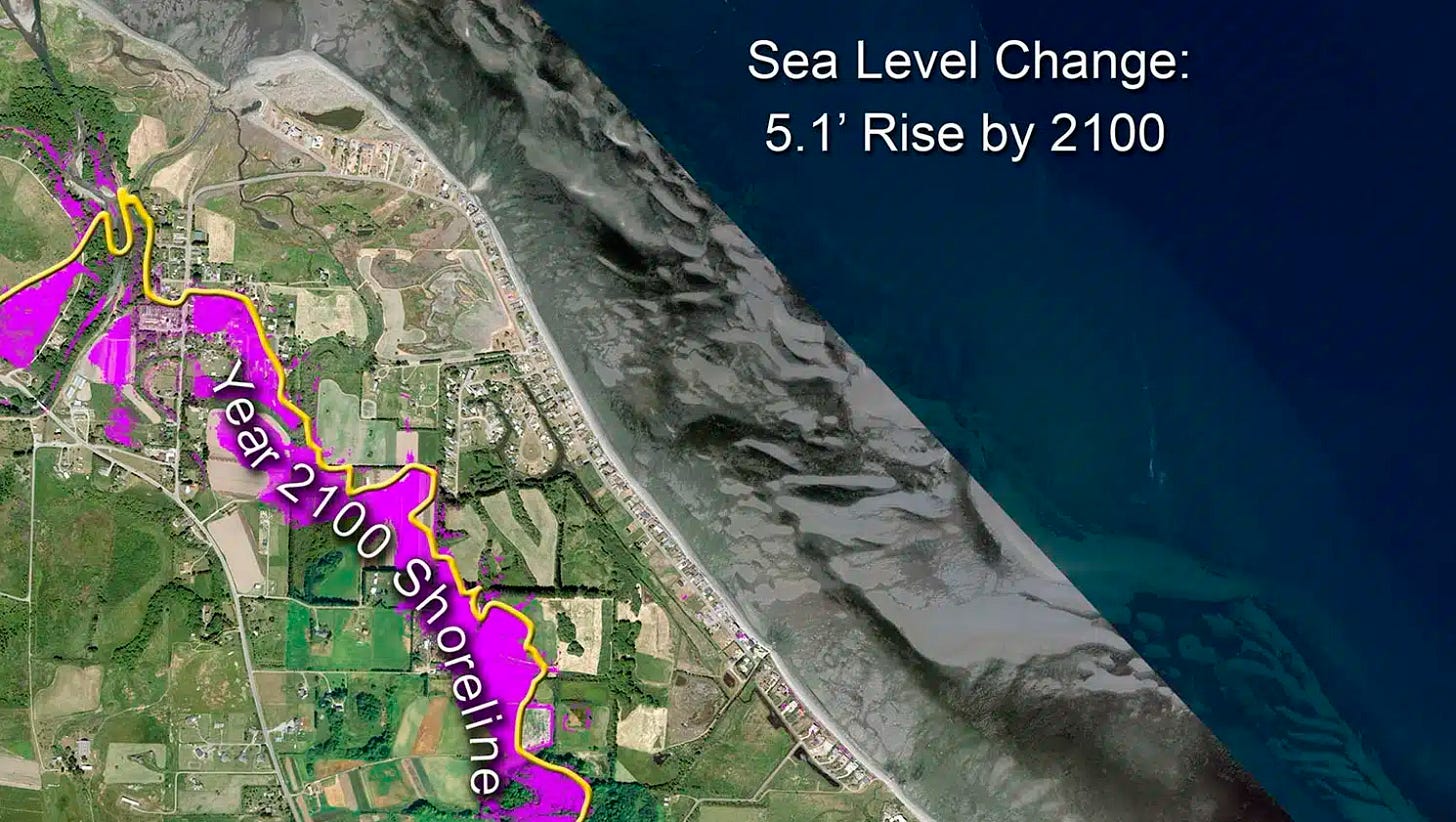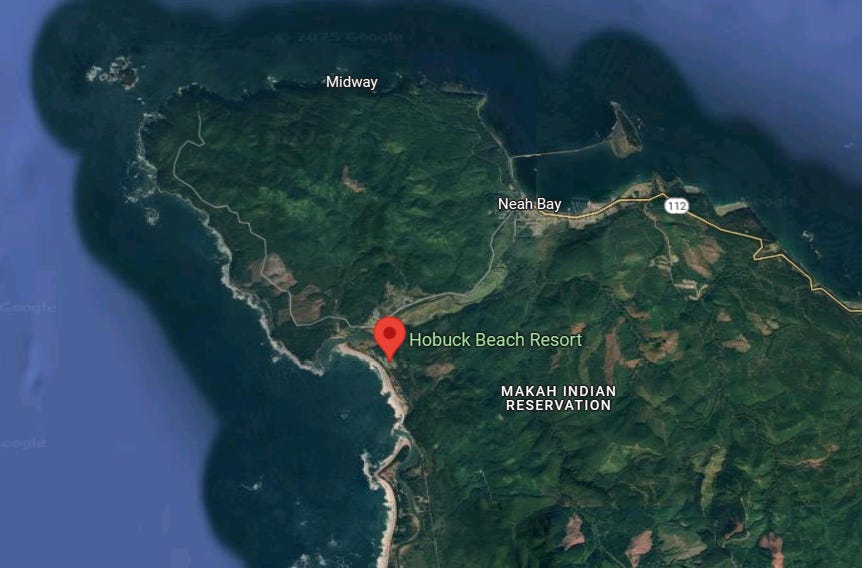Clallam County and the Jamestown Tribe are pushing plans to remove homeowners from 3 Crabs Road, but local media failed to interview any residents. Instead, it amplified voices from the same agencies promoting buyouts and hosting beach walks funded by NGOs with tribal ties. Meanwhile, tribes like the Makah are receiving millions to relocate inland—while still building new developments on the coast.
Five months after Clallam County announced plans to explore a “relocation strategy” that could evict homeowners from private property along 3 Crabs Road, legacy media has finally noticed. Credit, in part, goes to KONP Radio for covering the story. But even this long-awaited report missed a critical perspective—the people who actually live on 3 Crabs Road.
The story leaned heavily on official narratives. The reporter interviewed Bruce Emery, Clallam County’s Director of Community Development, who criticized bulkheads for worsening erosion, and Anne Soule, Vice Chair of the Marine Resources Committee (MRC), who also happens to be an activist with the League of Women Voters. Also included was LaTrisha Suggs, a member of the Jamestown S'Klallam Tribe and Chair of the MRC. None of them live on 3 Crabs Road.
What’s missing? Any voice from the residents whose lives and properties are directly threatened—not just by natural forces, but by a government-backed relocation scheme. That omission is glaring, especially when you consider that the worst flooding in the area occurred the day after the County and Tribe held a ribbon-cutting ceremony to celebrate the Meadowbrook Estuary restoration—a project that removed an armored dike that had protected the area for decades.
Had the residents been interviewed, we may have heard how that project—praised by environmentalists—directly contributed to the inundation of private homes. Instead, KONP’s sources are the very agencies and tribal interests that are actively planning how to acquire these same properties, often for below market value. That’s not balanced journalism. That’s narrative management.
Ousting agencies are now hosting free beach walks
It gets more cynical. The Marine Resources Committee—the same county agency advocating for the removal of 3 Crabs Road homes—is now inviting the public to attend “free Shore Friendly community beach walks.” Topics include sea level rise and alternatives to bulkheads.
These beach walks will be led by Jon Waggoner, a member of the Jefferson County Marine Sources Committee, an agency focused on marine and nearshore environments, including “the ancestral lands and waters of the Coast Salish Peoples who have inhabited this area since time immemorial and who continue to steward it for future generations.”
The walks are sponsored by a nongovernmental organization (NGO), the Northwest Straits Foundation, part of a tightly woven network of environmental NGOs and consulting firms, including Herrera Environmental Consultants and the Shore Friendly Program, all working in close coordination with tribal entities. These groups frequently share staff, funding, and objectives—and one key objective is the “restoration” of shorelines currently occupied by homeowners.
Despite their friendly names and educational tone, these outreach events are not neutral. They are public relations tools designed to soften the public to policies that often displace residents and devalue private land. While they speak the language of "co-management" and "Indigenous stewardship," their actions often lead to homeowners losing their property rights in favor of abstract environmental goals or tribal development plans.

Hypocrisy on the coast
Consider the case of the Makah Tribe. In 2024, the Tribe received $2.8 million from the State of Washington for planning a relocation to higher ground due to sea level rise. That’s on top of millions more in climate resilience grants for water, energy, and wastewater infrastructure.
This funding was framed as a necessary step to preserve the Tribe's safety and sovereignty in the face of rising seas. That’s a valid concern—but it raises a serious question when, in the same breath, the Makah Tribe announces plans to build a beachfront motel on Hobuck Beach, directly in the path of the same climate threats.
If sea level rise is so imminent that the Tribe must abandon its traditional village, why build a tourist motel at sea level? Why are some waterfront properties targeted for removal, while others are developed with government support?
The bigger picture
This is not just a story about environmental science or coastal management. It’s a story about power, influence, and selective storytelling. Residents of 3 Crabs Road are being squeezed between rising tides and rising pressure from government and tribal agencies with overlapping agendas—and little incentive to protect private property rights.
When public agencies and tribal governments act as both regulators and beneficiaries of coastal “restoration,” the potential for abuse is real. When nonprofits masquerade as neutral educators while advancing the same goals as their funders, the public is being misled. And when media outlets fail to speak with the people most affected, they abdicate their responsibility to the community.
If Clallam County is serious about addressing sea level rise and coastal ecosystem resilience, then it must also be serious about fairness, transparency, and accountability. That begins with hearing all voices—not just the ones invited to the table.







There’s been a huge environmental push for many years. Europe is pushing its people toward starvation with their push to get rid of farming, because it “harms” the environment. Similar behaviors in the United States are almost exclusively used to manipulate people into doing something, they ordinarily wouldn’t do, to save the world.
Almost all of these environmental pushes can easily be traced to the real motivations, which is money, power, and control.
Clallam Country has completely signed onto the environmental wacko train and has manipulated the public into doing or supporting things on a basis of fear. Fear that if they don’t go along with the environmentalists environmental save of the day they’ll be cancelled.
Meanwhile the country devolves further and further into poverty and drug addiction for young people due to lack of any meaningful employment or prospect for employment. Saving the environment usually only supports monetarily the peopling advocating for it and the rest of the population be damned.
Humans have inhabited earth for roughly 300,000 years. Someone please tell me where along that 300,000 years are the exact genealogical and time markers that distinctly separate an aboriginal, ( native ? ), human from all others. Humans traveled by land from their very beginning and travel by water soon followed. How far can one travel from the location of their birth before they loose the aboriginal or native classification ? There is cultural value in everyone's ancestry. So why do we isolate a relatively small culture group for separate rights, privileges and never ending charity ? In my Sequim area the most formidable, powerful and wealthy family is the Jamestown Tribe. I struggle to understand why local and Federal governance continues to give the Jamestown Tribe constant advantages, grants and other forms of donations. After Federal hand outs the Tribe uses their exclusive gaming rights to siphon the wealth of area residents. Too many give their Social Security and retirement checks to the Tribe's exclusive gaming rights. It is impossible to reconcile this blatant discrimination with equity, fairness and justice for all. If we are all to be friends and neighbors, there can be no legal advantage or disadvantage determined by who your daddy was.